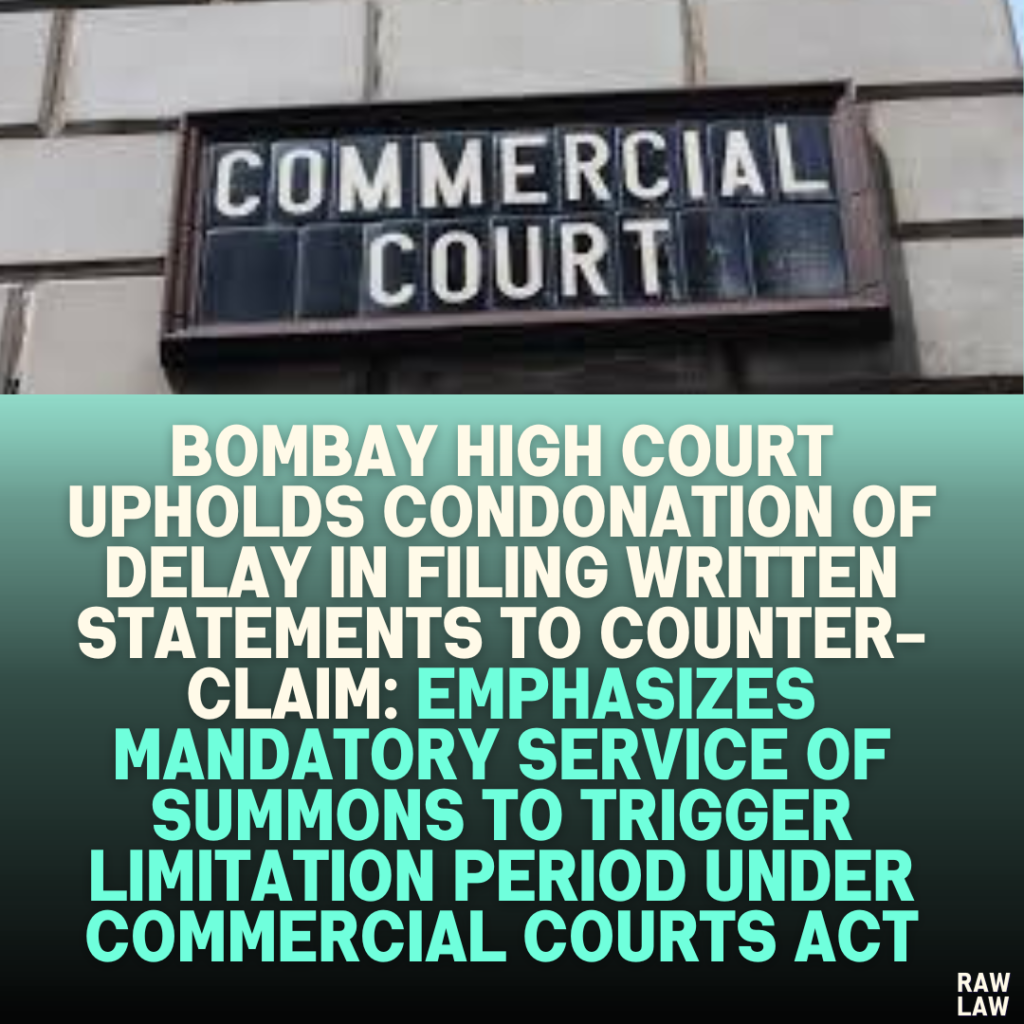Court’s Decision:
The Bombay High Court dismissed a writ petition challenging the trial court’s decision to condone delays in filing written statements to a counter-claim in a commercial suit. The Court upheld the trial court’s interpretation that the limitation period for filing written statements does not commence until summons for the counter-claim are properly served. Consequently, the petitioners’ challenge to the trial court’s condonation of delay was found baseless, and the impugned order was affirmed.
Facts of the Case:
- Commercial Suit Background:
- Plaintiffs filed a commercial suit seeking:
- Declaration of their rights in a property.
- A 45% share of the carpet area of a constructed building (20,418 sq. ft).
- Compensation of ₹3.66 crores along with interest.
- Defendants 1-4 (petitioners) opposed the suit and filed a counter-claim seeking recovery of excess area and possession.
- Plaintiffs filed a commercial suit seeking:
- Counter-Claim Details:
- Filed by Defendants 1-4 on March 31, 2022.
- Copies of the counter-claim served:
- On plaintiffs on April 20, 2022.
- On Defendants 5-13 on June 10, 2022.
- Applications for Delay Condonation:
- Plaintiffs filed an application (Exhibit 72) seeking condonation of a 22-day delay in filing their written statement.
- Defendants 5-13 filed an application (Exhibit 88A) for condonation of a 35-day delay in filing their written statement.
- The trial court condoned both delays, imposing costs of ₹10,000.
- Challenge by Defendants 1-4:
- Defendants 1-4 challenged the condonation of delay, arguing that it violated the mandatory 120-day limitation period under the Commercial Courts Act, 2015.
Issues Raised:
- Whether the 120-day limitation period for filing written statements applies to counter-claims in the same manner as it does to plaints.
- Whether the limitation period can commence without the issuance of summons for the counter-claim.
Petitioner’s Arguments (Defendants 1-4):
- Mandatory Limitation Period:
- Argued that under the Commercial Courts Act, a strict 120-day limitation applies to filing written statements, without exceptions.
- Asserted that allowing condonation of delay would undermine the legislative intent of ensuring expeditious disposal of commercial disputes.
- Procedural Compliance Irrelevant:
- Claimed that service of summons for the counter-claim was unnecessary since the respondents had already received copies of the counter-claim.
- Judicial Precedent:
- Relied on Supreme Court rulings emphasizing the binding nature of the 120-day limitation in commercial suits.
Respondent’s Arguments (Plaintiffs and Defendants 5-13):
- Service of Summons Mandatory:
- Argued that without proper service of summons for the counter-claim, the limitation period for filing written statements could not commence.
- Emphasized that the counter-claim must be treated as a plaint under Order VIII Rule 6A(4) of the CPC.
- Principles of Natural Justice:
- Highlighted the need to balance procedural compliance with fairness, asserting that procedural lapses by the petitioners should not disadvantage the respondents.
- Non-Compliance by Petitioners:
- Asserted that petitioners failed to comply with mandatory rules for serving summons and initiating the counter-claim.
Analysis of the Law:
- Counter-Claim as a Plaint:
- Under Order VIII Rule 6A(4) of the CPC, a counter-claim is treated as a plaint and must follow all procedural rules applicable to plaints, including the issuance of summons.
- The Court emphasized that procedural rigors under the Commercial Courts Act apply equally to plaints and counter-claims.
- Limitation Period Commencement:
- The limitation period for filing written statements begins only after summons for the counter-claim are properly served.
- In this case, the petitioners failed to issue summons, rendering the limitation period inapplicable.
- Procedural Non-Compliance:
- The Court noted that Defendants 1-4 did not serve summons for their counter-claim, violating the procedural requirements under the CPC.
Precedent Analysis:
- SCG Contracts (2019):
- The Supreme Court held that the 120-day limitation for filing written statements in commercial suits is mandatory.
- Applied to both plaints and counter-claims, provided proper procedural compliance is met.
- Maria Albert Stanly (Madras High Court):
- Reiterated that counter-claims must follow the same procedural rules as plaints, including summons service.
- PSA Nitrogen (Delhi High Court):
- Established that the limitation period for filing written statements does not commence without proper service of summons.
Court’s Reasoning:
- Adherence to Procedural Rules:
- The Court held that treating counter-claims as plaints ensures consistency in procedural rules within the same suit.
- Deviation from this principle would create anomalies and undermine legislative intent.
- Role of Summons:
- Service of summons is critical to initiating the limitation period for filing written statements.
- The Court found that the petitioners’ failure to serve summons invalidated their challenge to the condonation of delay.
- Fairness and Natural Justice:
- The Court emphasized that procedural compliance must align with fairness and equity, particularly when delays arise from non-compliance by the opposing party.
Conclusion:
The High Court dismissed the writ petition, affirming the trial court’s decision to condone the delay in filing written statements. The Court clarified that procedural compliance under the CPC and the Commercial Courts Act is mandatory and integral to ensuring fairness in commercial litigation.
Implications:
- Strict Procedural Compliance:
- Reinforces the importance of adhering to procedural rules for plaints and counter-claims in commercial suits.
- Service of Summons:
- Highlights the critical role of summons in initiating limitation periods and ensuring procedural fairness.
- Precedential Clarity:
- Establishes consistency in the application of procedural rules across commercial and civil suits.



